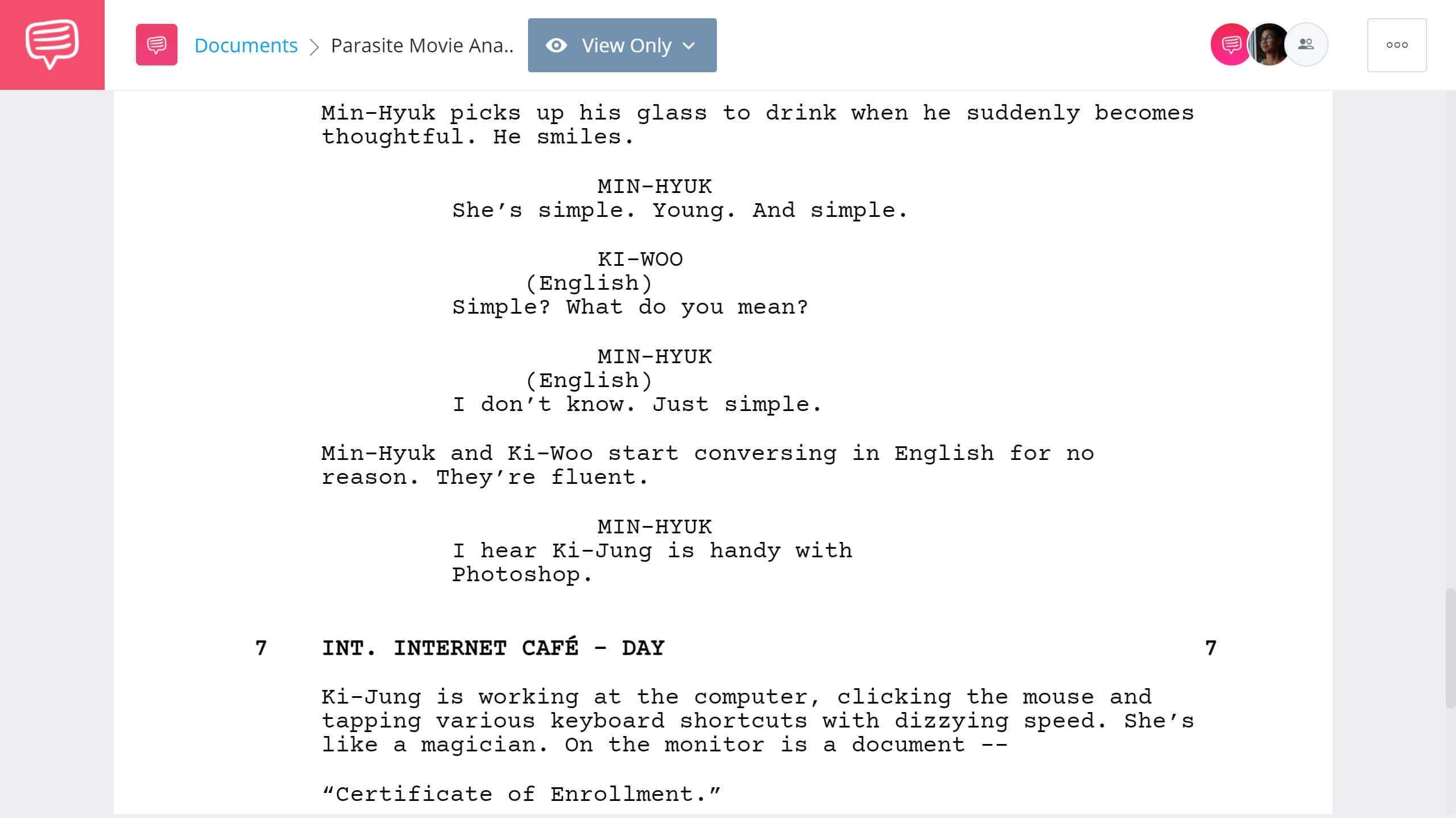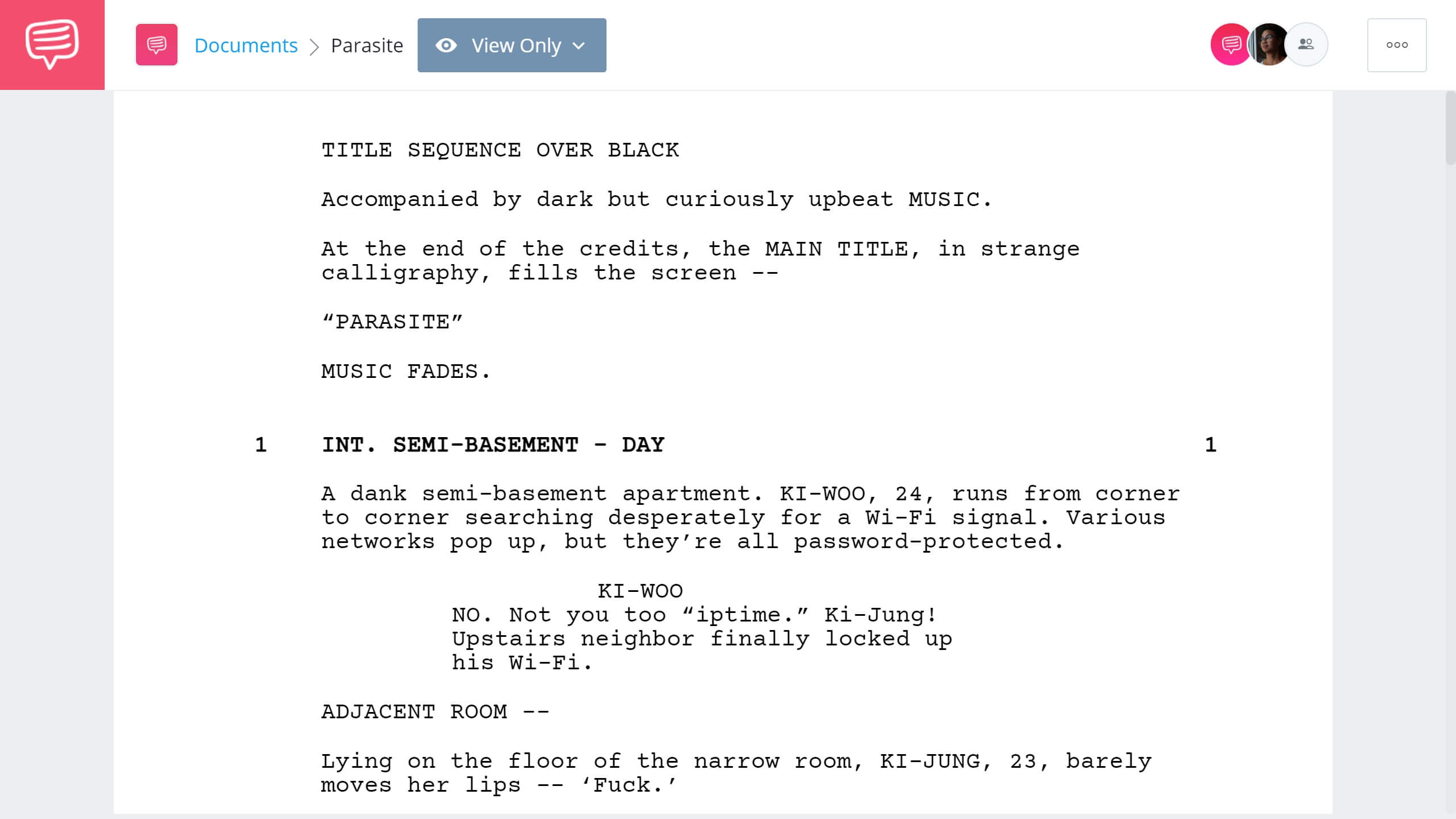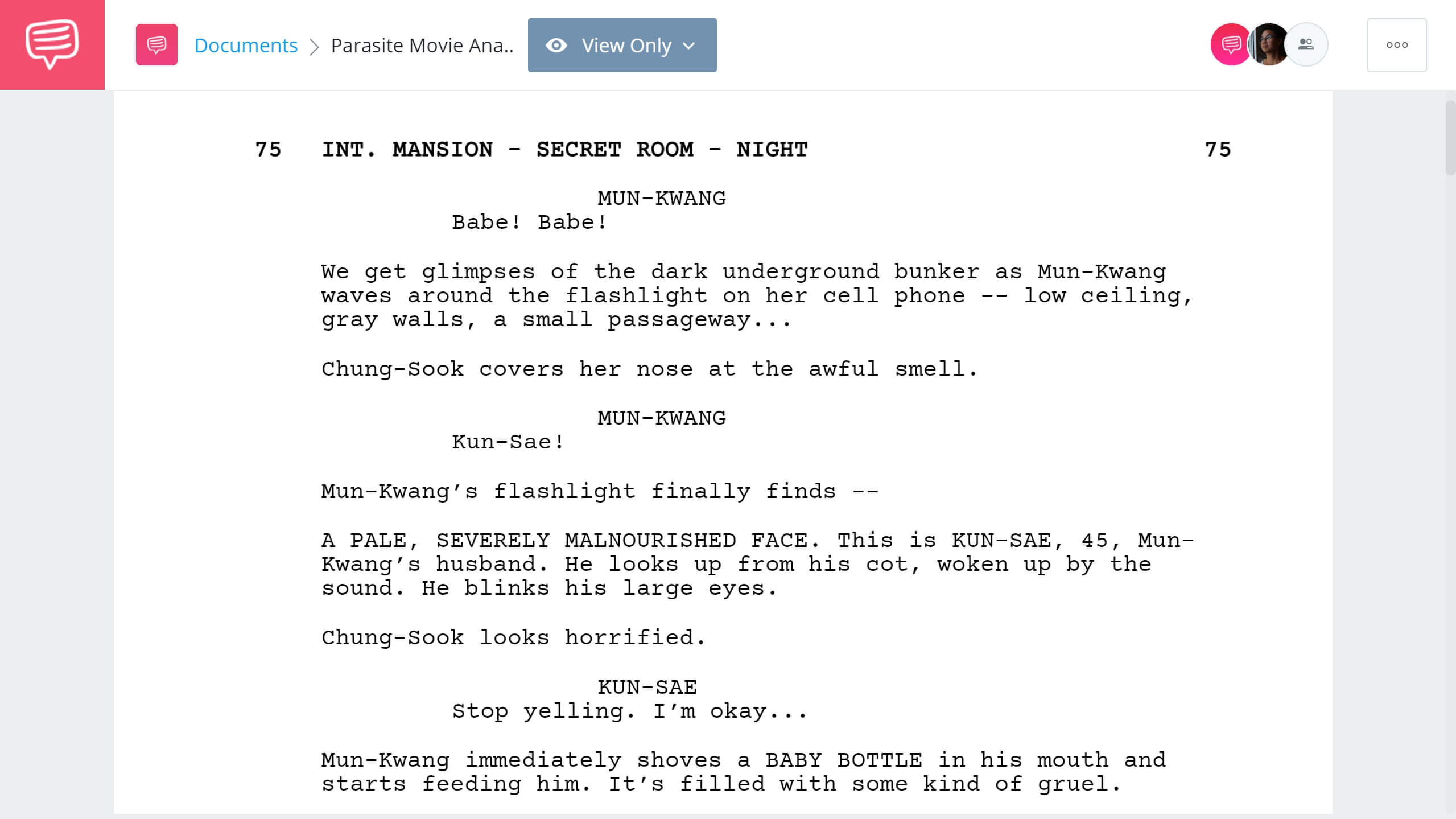Parasite director Bong Joon-ho’s insightful and engaging comedy/thriller became one of the most talked-about films of the year and set a new precedent for the mark a South Korean movie can leave on United States’ movie-going audiences. The film is packed with social commentary, thrilling moments, and plenty of meaty writing worthy of a full ‘Parasite movie analysis’.
Parasite Movie Synopsis - what is Parasite about
Parasite Synopsis: Pulling off the Con
What is Parasite about? The first half of Parasite plays out largely as a comedy-drama with a compelling narrative and thought-provoking themes. We’ll be taking a look at all of the ingredients to made Parasite one of the best films of 2019 and one of the best South Korean films ever made, but first, let’s get started with a Parasite synopsis.
The Kim family lives in a semi-basement and struggles to keep food on the table. They take on odd jobs for cash like folding pizza boxes, and they rely on unprotected wi-fi networks and street-cleaning pesticides to keep their home insect-free.

Parasite movie synopsis • street-cleaning pesticides
Ki-woo, the son, is gifted a scholar’s stone or suseok by a friend and given a recommendation for a tutoring job with a wealthy family. Ki-woo and his sister Ki-jung forge credentials for the job, and thus begins the long-con that sees each member of the Kim family infiltrating the upper-class Park family one-by-one. There are plenty of examples of subtle foreshadowing all throughout this opening act that circle back around by the end of the film.
Parasite meaning conveyed in screenplay excerpt
If you are interested in reading through the rest of the script, you can find it below. And, if you would like a deep-dive into the inner workings of the screenplay, be sure to read our Parasite script teardown.
Ki-jung begins working for the parks under the guise of an art-therapy teacher. Ki-taek, the father, begins working as the Park family chauffeur after the Kims have removed their previous chauffeur from his position, and similarly Chung-sook, the mother, replaces Moon-gwang, the housekeeper who has served the home longer than the Park’s have even lived there. Chung-sook is framed as deceiving the family by hiding a dangerous illness. The real deception is carried out by the Kims, and it works flawlessly.
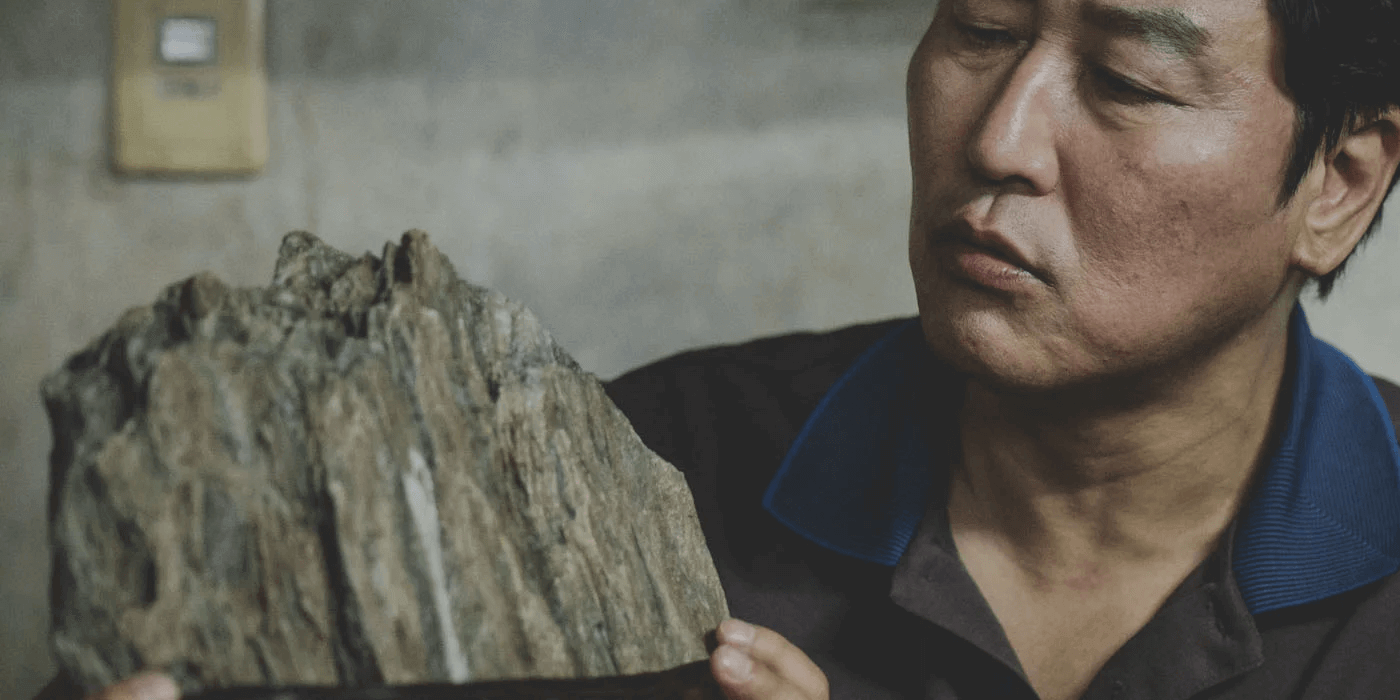
Ki-taek with the scholar’s stone
The contrast in appearance between the Kims’ semi-basement home and the lavish home of the Park family is impossible to miss. The brilliant set dressing of Parasite combined with the striking architectural-design choices perfectly reinforce the themes of the film, but more on the themes after we finish our Parasite summary.
For some Parasite movie analysis straight from the auteur himself, check out this scene breakdown from Bong Joon-ho. Alongside actor Choi Woo-sik, he explains the significance of production design elements from the beginning of the film, such as the cultural context of scholar’s stones in South Korea and the idea of distant hope conveyed by the semi-basement window.
What is Parasite about? Parasite analysis straight from the director
Once the entire Kim family is employed in the Park household, the lower-class con-artists begin to assume more and more of this fabricated identity of wealth. They take the affluent home as their own while the Parks are away… and that’s when Moon-gwang shows back up and everything changes. Let’s shift gears from a Parasite summary to a Parasite movie analysis.
Related Posts
What is Parasite About?
Parasite Analysis: Navigating the Shift
At its exact mid-point, Parasite undergoes a massive tonal shift. In our Parasite movie analysis video, this mid-point scene was the focus.
Be sure to watch our video essay on the scene for more detail and deeper Parasite analysis.
Parasite Genre Shift • Subscribe on YouTube
A tonal shift this extreme could easily take viewers out of the film or feel like a jumping-the-shark moment, but in the hands of Bong Joon-ho, this shift is portrayed in a way that not only feels effortless but greatly enhances each half of the film that preceded and follows it.
What is Parasite about? This excerpt reveals the script’s major plot twist
Moon-Gwang’s return to the house and eventual reveal of the secret basement keeps us on the edges of our seats as viewers and seamlessly blends from the drama/comedy centered first half into the thriller/tragedy centered latter half. Bong Joon-ho displays a mastery over genres and tones with this mid-point shift.
Did You Know?
Lee Jeong-eun, who plays Moon-Gwang the housekeeper, also provided the vocalization for Okja the super pig in Bong Joon-ho’s previous film.
Parasite synopsis
Parasite Ending: Orchestrating Chaos
Following the film’s major twist, Parasite continues in a far darker tone until it’s ending. In our Parasite movie analysis, we found that although the tone and style change, the themes at play remain consistent from the first half to the second half, and continue to be developed further as the film progresses.
Parasite’s final scene, in case you want a refresher on the chaos
For additional insights into director Bong Joon-ho’s creative process, listen to him discuss his decisions and directorial style with the other 2019 DGA nominees for best director including Martin Scorsese, Quentin Tarantino, Taika Waititi, and Sam Mendes:
Parasite summary and meaning discussed by filmmakers
Power shifts from Moon-gwang and her incognito husband to the Kim family as both lower-class families fight for leverage over each other. Both parties have dark secrets, and both threaten to expose the other to the Park family, who remain above all the drama, currently unaware. The film’s social commentary on class is at its strongest in this depiction of the lower classes fighting against each other rather than against the 1% who truly hold more accountability.
Outside of the sub-basement, violence erupts, and the prophetic scholar’s stone becomes an instrument of violence. Blood is shed and deaths are cast at the birthday party of the Park family’s youngest child.
All three families at play are damaged by this explosive act of violence. The Kim family is destroyed; Ki-jung is killed, Ki-woo is left brain-damaged, and Ki-taek is forced into hiding after he snaps and acts out a classism-driven murder in the chaos of the birthday party. The metaphorical themes are presented in as literal a way as possible with the act of this stabbing.
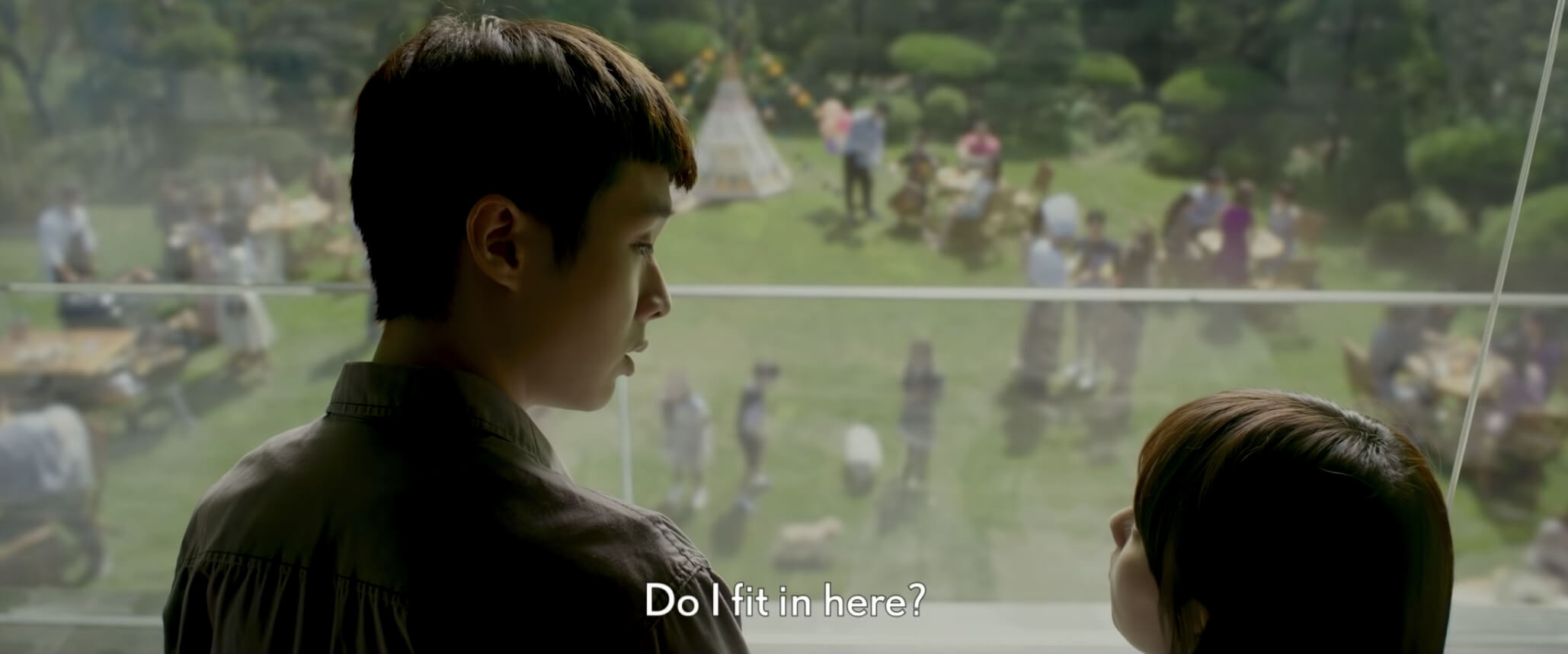
Ki-woo questions if his class prevents him from fitting in
Parasite’s ending features a sequence of Ki-woo’s plan to work hard, buy the house under which his own father now hides, and reunite the family… but this plan is nothing but a fantasy. The real Parasite movie ending is more bleak and, unfortunately, more realistic.
To explain Parasite’s ending, we turn to the director’s own words: “You know and I know - we all know that this kid isn't going to be able to buy that house. I just felt that frankness was right for the film, even though it's sad." The emotionally-affecting resonance of the ending is the perfect cap to the wonderfully layered social commentary spread throughout the film.
But, before we dig deeper into the social commentary, let’s take a look at how the film managed to break through to an unmatched audience size.
Related Posts
Parasite 2019 Film
The spread of Parasite
Parasite has proven to be a groundbreaking achievement for South Korean movies. For years the country has been producing some of the finest films and directors in the world of cinema, but Parasite has crossed new milestones in terms of global impact.
Parasite director Bong Joon-ho became the first South Korean filmmaker to win best director at the academy awards. Has also tied the record with Walt Disney for most Oscars awarded to an individual at a single ceremony. This is especially impressive given how ethnocentric the Academy Awards often unfold, prioritizing English-language films over foreign-language films much of the time.

Parasite 2019 cleans up at the Academy Awards
Parasite was not just the first South Korean film to win the foreign language prize at the Oscars but also the first foreign language film from any country to win the overall best picture prize. Equally impressive was Parasite becoming the first South Korean movie to win the Palme d’Or, which is the top prize at the prestigious Cannes Film Festival.
Parasite makes history by winning the Palme d’Or
Parasite was the first film since Marty in 1955 to win the top prize of both The Oscars and the Cannes Film Festival. These two powerhouse awards ceremonies rarely overlap and are comprised of entirely different audiences and judges and with entirely different viewing criteria and preferences. It speaks wonders to Parasite’s accessibility that it was received so well with such widely varying viewers.
The 2012 Academy Awards:
The Artist, a French and Belgian production, won best picture at the 2012 Academy Awards but was ineligible for the best foreign language film category as it is a silent film.
It wasn’t just awards records that Parasite broke in 2019. Parasite broke a number of financial records as well, including the highest foreign film opening weekend of all time for the UK box office, and a number of records with the Indie Box Office.
The record-setting trend continued for the Parasite film. After being added Hulu’s catalogue for exclusive streaming, it became the platform’s most streamed film in both the independent and foreign film categories, reaching even more audience members and wowing them with its immaculate presentation and resonant themes.
The cultural swell around Parasite is much deserved and hopefully leads more audience members to check out Parasite director Bong Joon-ho’s previous films and more South Korean cinema in general.
Parasite 2019 Meaning
Perfecting Social Commentary
“What is the movie Parasite about?” has many answers. One clear way to explain the movie is: “Parasite is about class.” Class is the primary target of social commentary within Parasite.
And every single element of the film from the scholar’s stone, to the architecture of the homes, to the very names of the families all contribute to this central theme. It’s no accident that the lower-class protagonists happen to have the single most common surname in South Korea.
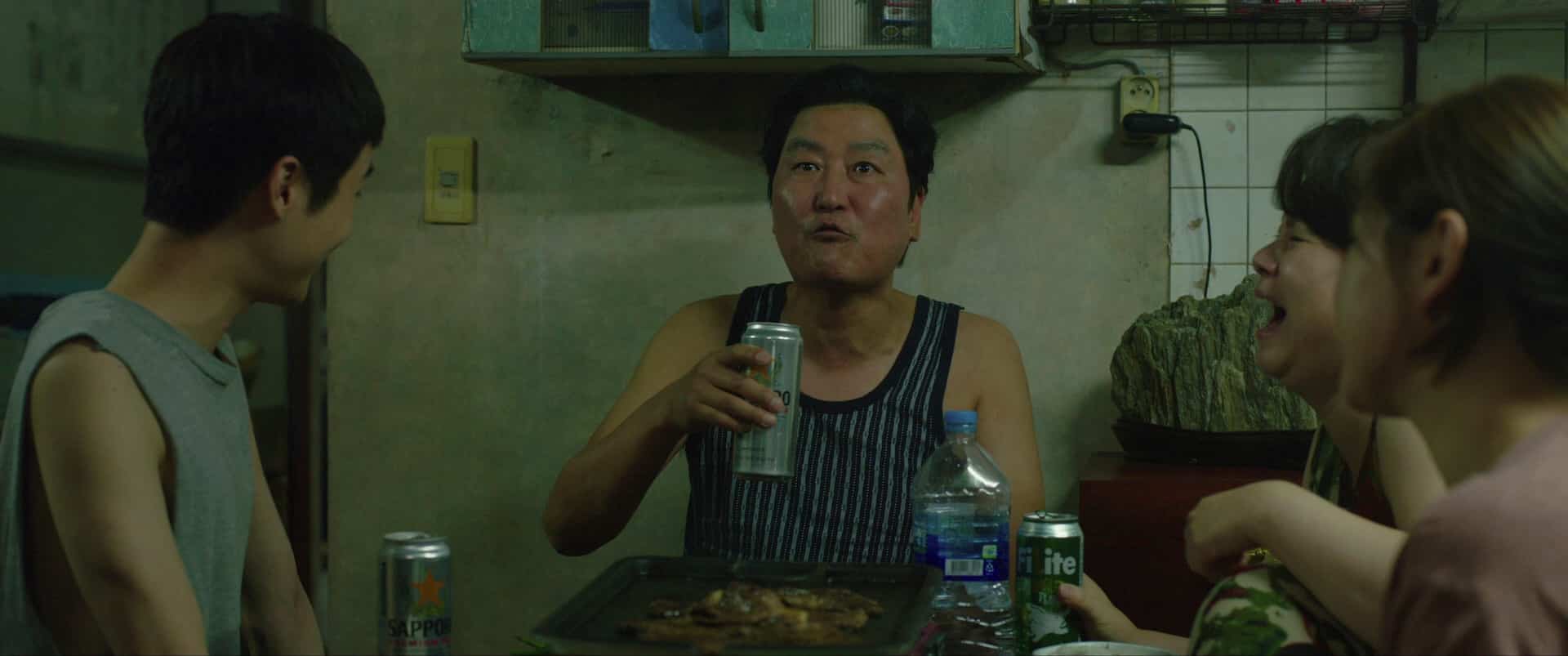
Parasite 2019: The Kim family
It is one of the most effective satires in recent memory. For a quick breakdown on satire, including a segment on Parasite, here's an explainer that will answer all your questions about how satire works.
3 Types of Satire Explained • Subscribe on YouTube
Parasite has a lot worthy of analysis and it has a lot to say. One of the main reasons why Parasite was such a massive success around the whole world in 2019 is because of its themes and messages of classism and the wealth divide, which are truly universal. These themes cross all cultural-barriers and can speak to the 99% anywhere in the world.
The topic of class is one that Bong Joon-ho has a clear fascination with. He’s skewered classicism in all of his films to some degree. Prior to Parasite in 2019, his most focused social commentary on class was found in his 2013 film Snowpiercer which saw the lower class positioned at the back of a train in squalid conditions while the wealthy lived large at the head of the train.
This same subject of class is less overt in Parasite but far more grounded and effectively subtle to the point of never overshadowing the story being told for the sake of its themes.

Tilda Swinton monologues about class in Snowpiercer • 2013
For a full deep-dive analysis into how the themes of Parasite were previously tackled in Bong Joon-ho’s other films, check out this video essay on the subject:
Parasite 2019 movie analysis
The Kim family may be below the Parks in status, but even they can look down on Moon-gwang and her husband. This secret basement reveals an even lower level of status below what we had thought was the floor with the Kim family.
Elevation clearly equates to status; the park’s have a multi-level home at the top of the hill while the Kim’s live below street level in a semi-basement, and the surprise 3rd party lives deep underground in a sub-basement. This vertical comment on status is illustrated cleanly in this alternate poster for the film, without spoiling the sub-basement reveal.
The flooding sequence, as depicted on the poster, also illustrates how the wealthy are unaffected by many of the debilitating circumstances that affect the lower classes as they are, quite literally, above the trouble.
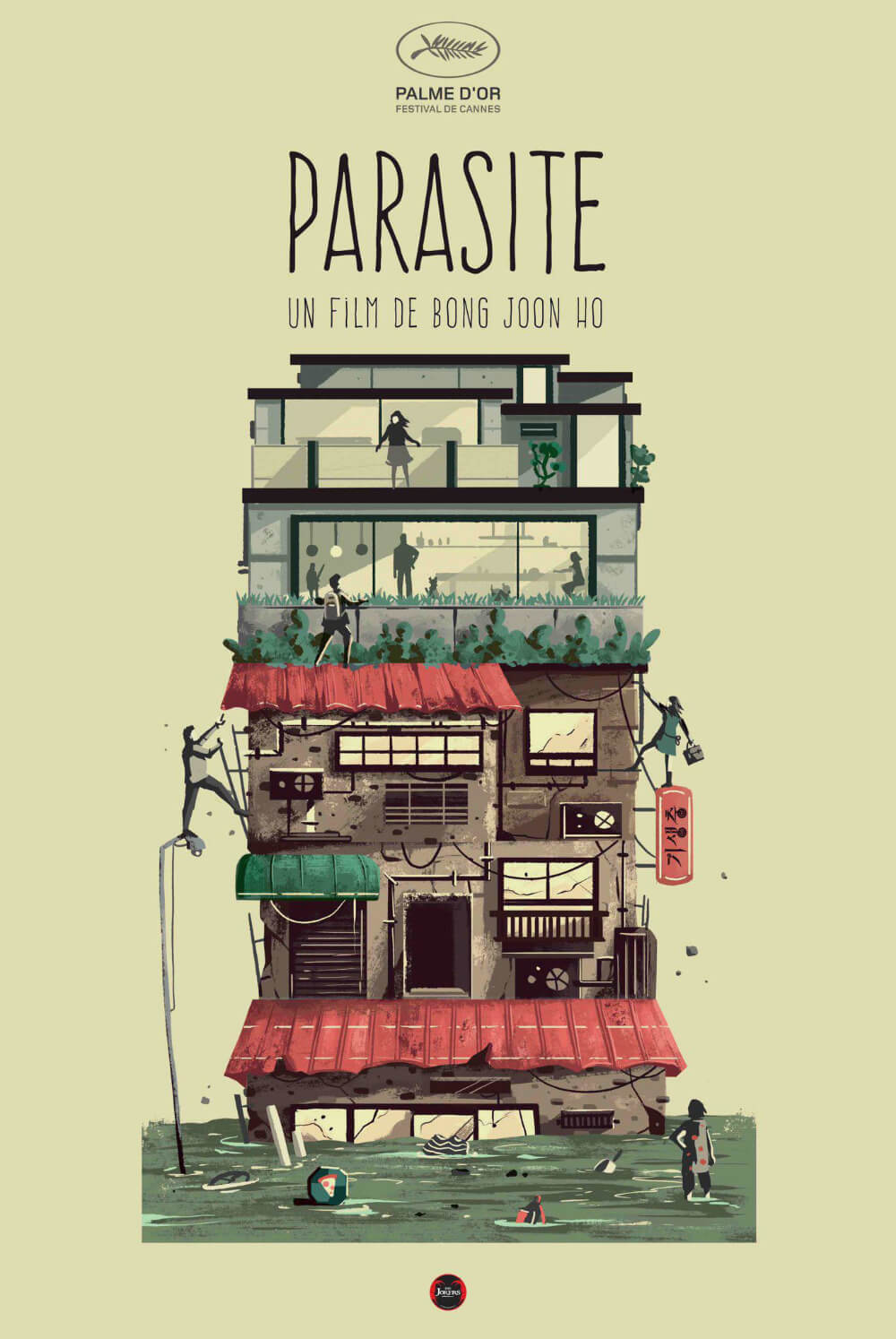
Parasite movie analysis in poster form
Parasite represents the most focused and refined approach to class as a subject that Bong Joon-ho has achieved, and that’s certainly saying something given his impressive body of work.
UP NEXT
How to set-dress like Bong Joon-ho
For more Parasite movie analysis, check out our article on how Bong Joon-ho creates meaning through set dressing. The article breaks down how to identify and breakdown set elements in a screenplay. Follow along with the Parasite script as StudioBinder is used to recreate what the actual script breakdown may have looked like.
Up Next: Set dressing in Parasite →
Showcase your vision with elegant shot lists and storyboards.
Create robust and customizable shot lists. Upload images to make storyboards and slideshows.

